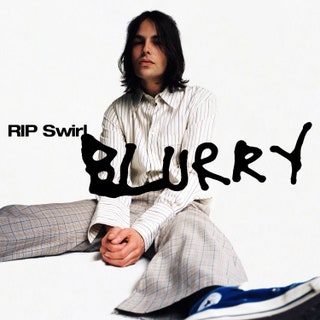On his debut album, the Berlin musician sets aside his techno proclivities in favor of a moody journey into a more innocent era of electronic music.
There are few things as surreal as watching the cyclical maw of nostalgia slowly swallow itself whole. If we’re to believe in the 20-year rule, right about now we should all be getting ready to cast off our throwback Matrix rave gear and Y2K-worshiping pop idols to make way for a roaring return of the dreadful Bush years. Yet it feels as if our window for reassessing the past has gotten smaller and smaller. With the last two decades of pop culture merely a thumb swipe away, much of our recent zeitgeist has been defined by how we’ve chosen to reconfigure images of the past in a way that suits our present selves. The divides between scenes, genres, and styles have become blurrier and messier as every last cultural artifact has been turned over to see what hidden jewels might lie underneath.
Luka Seifert, aka RIP Swirl, feels like a product of this pop-culture ouroboros. The Hamburg-born producer has all the traits of a typical underground DJ, having spent the last few years orbiting Berlin’s club scene both as part of the Einhundert art collective and through his own Paradise House parties, even scoring runways for prominent fashion brands along the way. He’s left behind a string of cassette-torn house tracks with a tastefully retro quality to them, but his more extended releases for Public Possession have given a deeper peek into his mindset, filtering his hypnotic electronic music through a dense haze of lo-fi guitars and muffled, alien dream pop.
Despite his techno proclivities, Seifert comes off like a ’90s alt kid at heart. He counts Duster and Dinosaur Jr. among his favorite bands, and the enigmatic name of his project is a veiled reference to The Larry Sanders Show. After the pandemic put a halt to his DJ bookings, Seifert retreated to the alternative music of his youth and set out to record his debut album, Blurry. Pulling influences from trip-hop, shoegaze, and movie soundtracks (specifically Lost in Translation and Trainspotting) that now feel like charming relics from indie cinema’s great boom, the resulting album is a moody journey into a more innocent era of electronic music. It’s a remarkably confident change in direction for RIP Swirl, its nocturnal mood capturing the playful sophistication of early-’00s electronica as seen through the fashion-damaged club culture of today.
While much of Seifert’s native dance-music culture revolves around a utopian ideal of communal, hedonistic release, the styles he draws on here are much more subdued. This is headphone music for late-night bus rides—the lonesome soundtrack for the long drive home after leaving the club a bit earlier than everyone else. After revving up with the snapping breakbeats of the title track, Seifert immediately drops us into full Maxinquaye territory with the snaking groove of “Love Song,” layering his acoustic snares with a shroud of hanging guitar feedback. He takes lessons from Yves Tumor’s big-beat revival and George Clanton’s washed-out Y2K pop, building many of Blurry’s tracks around perfectly concise drum loops that feel strangely timeless in their booming simplicity. Even when Seifert calls on guest vocalists, as he does with Clayjay on “Smiling Dog” or Ydegirl on “Pass Out,” these moments feel less like songs and more like impressions of bedroom pop condensed into narcotic loops.
For most of Blurry, however, Seifert wisely avoids the classic producer mistake of over-relying on guest vocalists, placing most of the focus on his own richly textured production. On “gUts,” he slows his rhythm down to a disassociated crawl, turning the sound of his hand sliding up and down the neck of his guitar into a mesmerizing downtempo pattern. With its delayed, head-nodding hi-hats, “Better” channels the intimate beatmaking exercises of experimental hip-hop acts like Prefuse 73, while “Alone Awake” rides along on a Four Tet-style slide, driven by a chalky drum pattern and Seifert’s layered, slithering guitar. Much of Blurry is instrumental for the better—until Seifert’s own vocals emerge on the penultimate “Slipping My Mind,” bringing the album to its climax with a druggy, disaffected chiller anthem that sounds like a forgotten cut from the Eternal Sunshine of the Spotless Mind soundtrack. In its reversed synths and gently epic sway, the entire song is infused with the same psychedelic awe Caroline Polachek has been dabbling in lately; it’s a wonderfully primitive embrace of the kind of wide-eyed sincerity that we seem to have lost somewhere down the line.
Culture has continued to evolve, whether we’ve been locked inside or not, and there’s a growing unease that the world we enter post-pandemic may not entirely resemble the one we left behind. RIP Swirl responded to his own isolation by simply returning to the music that made him and figuring out how to make it work in a post-rave landscape. By playing with the nostalgia of sounds that haven’t been reassessed yet—without giving into pure genre gimmickry—Seifert has created an album that marries the electronic underground of today with the dreamy guitar music that has endured in our cultural mythos. For all its murkiness, what makes Blurry stand out is how refreshingly earnest it feels.



0 comments:
Post a Comment